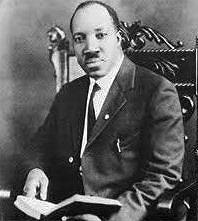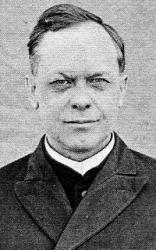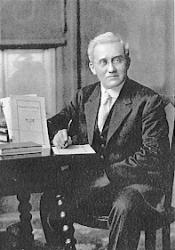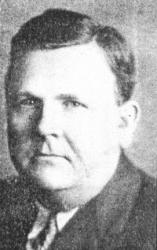
1880 - 1931 Person Name: G. T. H. Hymnal Number: 64 Author of "Jesus the Son of God" in Soul Inspiring Songs Garfield Thomas Haywood (July 15, 1880 – April 12, 1931) was an African-American pastor and song writer who served as Presiding Bishop of the Pentecostal Assemblies of the World from 1925 to 1931.
Haywood was born to Bennett and Pennyann Haywood in Greencastle,Indiana, in 1880 and moved to Haughville, a neighborhood in Indianapolis, at the age of three. As a child, he attended School 52 and then Shortridge High School. Haywood was employed by the Indianapolis Freeman and Indianapolis Recorder news papers as a cartoonist.
In 1909, Haywood founded Christ Temple church. Haywood's influence crossed ethnic boundaries; by 1913, Christ Temple had a bi-racial membership of 400 to 500 and later grew to 1500. Around 1915, Haywood received a copy of Frank Ewart's paper Meat in Due Season which argued for Jesus' Name doctrine. In response, Haywood invited the evangelist Glenn A. Cook to preach at Christ Temple, resulting in Haywood and his congregation converting to Oneness Pentecostalism and facilitating the spread of Oneness Pentecostalism throughout Indiana.
The third general council of the Assemblies of God convened in October 1915 on the agenda was a debate on the merits of the new Jesus'-name doctrine vs the traditional trinitarian doctrine. Haywood and E. N. Bell spoke on behalf of the Jesus' Name doctrine and Collins and Jacob Miller spoke against. The result was a draw and it was agreed to readdress the topic at the fourth general council in October 1916. At the fourth general council a statement of faith was enacted which soundly rejected Jesus'-name doctrine causing just over one fourth of the ministers including Haywood to leave the Assembles of God. In 1911 Haywood had become affiliated with the Pentecostal Assemblies of the World (PAW) and after his conversion helped convert the origination to Oneness Pentecostalism. Many of the former Assemblies of God ministers that left in 1916 formed the General Assembly of the Apostolic Assemblies which at the start of WWI merged with the PAW in order for its minsters to obtain noncombatant statues. The new and interracial organization appointed Haywood as its general chairman. By 1924 the PAW split on racial lines due to logistical and social problems created by Jim Crow laws and Haywood was appointed Bishop of the newly reorganized PAW.
Haywood composed many gospel songs including "Jesus, the Son of God", "I See a Crimson Stream of Blood", and "Do All in Jesus’ Name". Many of his songs were published in The Bridegroom Songs, which was published by Christ Temple. His songs are known for Oneness Pentecostal themes. Haywood was also an author and Oneness apologist. He wrote tracts, such as "The Victim of the Flaming Sword" and "The Finest of Wheat" as well as published Garfield Thomas Haywood (July 15, 1880 – April 12, 1931) was an African-American pastor and song writer who served as Presiding Bishop of the Pentecostal Assemblies of the World from 1925 to 1931.
Haywood was born to Bennett and Pennyann Haywood in Greencastle,Indiana, in 1880 and moved to Haughville, a neighborhood in Indianapolis, at the age of three. As a child, he attended School 52 and then Shortridge High School. Haywood was employed by the Indianapolis Freeman and Indianapolis Recorder news papers as a cartoonist.
In 1909, Haywood founded Christ Temple church. Haywood's influence crossed ethnic boundaries; by 1913, Christ Temple had a bi-racial membership of 400 to 500 and later grew to 1500. Around 1915, Haywood received a copy of Frank Ewart's paper Meat in Due Season which argued for Jesus' Name doctrine. In response, Haywood invited the evangelist Glenn A. Cook to preach at Christ Temple, resulting in Haywood and his congregation converting to Oneness Pentecostalism and facilitating the spread of Oneness Pentecostalism throughout Indiana.
The third general council of the Assemblies of God convened in October 1915 on the agenda was a debate on the merits of the new Jesus'-name doctrine vs the traditional trinitarian doctrine. Haywood and E. N. Bell spoke on behalf of the Jesus' Name doctrine and Collins and Jacob Miller spoke against. The result was a draw and it was agreed to readdress the topic at the fourth general council in October 1916. At the fourth general council a statement of faith was enacted which soundly rejected Jesus'-name doctrine causing just over one fourth of the ministers including Haywood to leave the Assembles of God. In 1911 Haywood had become affiliated with the Pentecostal Assemblies of the World (PAW) and after his conversion helped convert the origination to Oneness Pentecostalism. Many of the former Assemblies of God ministers that left in 1916 formed the General Assembly of the Apostolic Assemblies which at the start of WWI merged with the PAW in order for its minsters to obtain noncombatant statues. The new and interracial organization appointed Haywood as its general chairman. By 1924 the PAW split on racial lines due to logistical and social problems created by Jim Crow laws and Haywood was appointed Bishop of the newly reorganized PAW.
Haywood composed many gospel songs including "Jesus, the Son of God", "I See a Crimson Stream of Blood", and "Do All in Jesus’ Name". Many of his songs were published in The Bridegroom Songs, which was published by Christ Temple. His songs are known for Oneness Pentecostal themes. Haywood was also an author and Oneness apologist. He wrote tracts, such as "The Victim of the Flaming Sword" and "The Finest of Wheat" as well as published The Voice in the Wilderness, a publication that became the official organ of the Pentecostal Assemblies of the World in 1925.
After his death in 1931, Haywood was buried in Crown Hill Cemetery, and in 1980, the city of Indianapolis renamed the segment of Fall Creek Drive where Christ Temple is located Bishop Garfield T. Haywood Memorial Way. The Voice in the Wilderness, a publication that became the official organ of the Pentecostal Assemblies of the World in 1925.
After his death in 1931, Haywood was buried in Crown Hill Cemetery, and in 1980, the city of Indianapolis renamed the segment of Fall Creek Drive where Christ Temple is located Bishop Garfield T. Haywood Memorial Way.
--en.wikipedia.org/wiki
G. T. Haywood


 My Starred Hymns
My Starred Hymns











